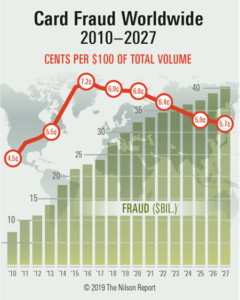Credit Card Fraud Impacts
The Impacts of Credit Card Fraud
Credit card fraud impacts has become a major issue in recent years. More so, since the advent of credit cards with Near Field Communications (NFC) chips. As technology advances, criminals come up with increasingly sophisticated ways to steal information and commit fraud. Fraud rings are a global issue, with some being state sponsored. This not only poses a significant risk to individuals, but to the entire nation as well. In this blog post, we will explore some of the risks and impacts of credit card fraud on a nationwide level.
One of the biggest risks of credit card fraud is financial loss. When a fraudster gains access to someone’s credit card information, they can use it to make fraudulent purchases or withdraw cash. Victims could see charges on their account that they did not authorize, and many may not even notice the charges until it’s too late. This can result in devastating financial loss not only for individuals but also to retailers and banks.
Aside from financial loss, credit card fraud can also have a serious impact on businesses. Retailers and banks are responsible for covering the losses, but not mandatory, of fraudulent transactions, which can amount to billions of dollars across the country annually. This cost can put pressure on small businesses, especially, reducing their profitability or even causing them to shut down.
How Fraud Impacts National Security
The impact of credit card fraud can be even greater at a national level. Sophisticated fraudsters and hackers can target major financial institutions, causing severe damage to the economy. The loss of funds and credibility within the banking system could lead to reduced investment opportunities, diminished access to credit, and an overall negative impact on the stock market.
The FTC (Federal Trade Commission) reported a 70% increase from 2020 through 2021 with more than $5.8 billion dollars in loss. This has devastating impacts on the general consumer, retailers and businesses. A quote from the FTC article that can be found here states:
“Of the losses reported by consumers, more than $2.3 billion of losses reported last year were due to imposter scams—up from $1.2 billion in 2020, while online shopping accounted for about $392 million in reported losses from consumers—up from $246 million in 2020.”
New Data Shows FTC Received 2.8 Million Fraud Reports from Consumers in 2021
Another great article from CardRates.com shows “15 Disturbing Credit Card Fraud Statistics“. In that article it shows Credit Card Fraud World Wide from 2010 with projections through 2027. But also shows the United States as #1 in credit card fraud loss.

Other Ways Fraud Can Have Impacts
Furthermore, there is a risk that fraudulent transactions could result in strained relationships with customers. When people fall victim to fraud, they become wary of using credit cards in general, and that could end up costing credit card companies and financial institutions in the long run. This could prove to be a serious hit for the financial sector and have a lasting impact on people’s trust in the industry.
In conclusion, credit card fraud poses a significant risk to individuals, small businesses, and the economy as a whole. It is important to take proactive measures to prevent and detect credit card fraud. Read more about ways to protection yourself here. Checking your bank card account activity regularly, even have alerts sent to your phone or email for every transaction. Be cautions of how and where you use your credit card. Additionally, report any suspicious activity, and being cautious when sharing your personal and financial information. Credit card fraud should not be taken lightly, and concerted efforts are needed to protect yourselves and the economy from the risks posed by it.
Read more about other fraud alerts to be aware of.


